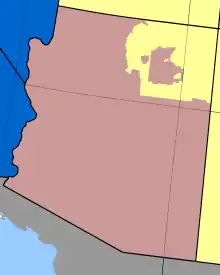Time in Arizona
Time in Arizona, as in all U.S. states, is regulated by the United States Department of Transportation[1] as well as by state and tribal law.
On March 21, 1968, the Arizona legislature passed the final version of SB 1, placing Arizona under standard time.[2]:629[3] The bill had been working its way through the legislature since January of that year, and was sponsored by state Senators Tenney, Goetze, Porter, Halacy, Garfield, Campbell, Lewis, Gregovich, Giss, Crowley, and Holsclaw. It passed the Senate 25–3–2, and afterwards the bill was passed by the House 49–1–10. It was approved by Governor Jack Williams the same day.[3]
Arizona is in the Mountain Time Zone and most of the state (with exceptions noted below) remains in Mountain Standard Time (MST) all year. Thus, during daylight saving time, from March to November, most of Arizona has the same time as the Pacific Time Zone.[4]
Daylight saving time

Unlike most of the United States, Arizona does not observe daylight saving time (DST), with the exception of the Navajo Nation, which does observe DST. The Hopi Reservation, which is not part of the Navajo Nation but is geographically surrounded by it, does not observe DST.[4]
The tz database version 2021a contains two time zones for Arizona:
| CC | Coordinates | TZ | Comments | UTC offset | UTC offset DST | Notes |
|---|---|---|---|---|---|---|
| US | +332654−1120424 | America/Phoenix | MST - Arizona (except Navajo) | −07:00 | −07:00 | |
| US | America/Shiprock | −07:00 | −06:00 |
Example
When daylight saving is not active, the time in Phoenix and Denver is the same (Mountain Standard Time), and both are one hour ahead of San Diego (Pacific Standard Time).
When daylight saving is active, the time in Phoenix (Mountain Standard Time) and San Diego (Pacific Daylight Time) is the same, and both are one hour behind Denver (Mountain Daylight Time).
| California | Arizona | Colorado | Ref. | ||
|---|---|---|---|---|---|
| San Diego | Phoenix | Navajo Nation | Denver | ||
| Standard time (winter) | 1 p.m. PST | 2 p.m. MST | 2 p.m. MST | 2 p.m. MST | [5] |
| Daylight time (summer) | 2 p.m. PDT | 2 p.m. MST | 3 p.m. MDT | 3 p.m. MDT | [6] |
References
- "Uniform Time". US Department of Transportation. 13 February 2015. Archived from the original on 24 August 2018. Retrieved 24 August 2018.
The U.S. Department of Transportation (DOT) oversees the Nation's time zones and the uniform observance of Daylight Saving Time. The oversight of time zones was assigned to DOT because time standards are important for many modes of transportation.
- "Session laws, State of Arizona, 1968, Twenty-Eighth Legislature, Second Regular Session, Second to Fourth Special Sessions". State of Arizona. Retrieved October 13, 2018.
- "Journal of the Senate, State of Arizona, 1968, Twenty-Eighth Legislature, Second Regular Session, Fourth Special Session". Arizona Memory Project. 1968. p. 740.
- "Time Zones in Arizona, United States". timeanddate.com. Retrieved March 9, 2019.
- "The World Clock Meeting Planner for March 1, 2019". timeanddate.com. Retrieved March 9, 2019.
- "The World Clock Meeting Planner for April 1, 2019". timeanddate.com. Retrieved March 9, 2019.